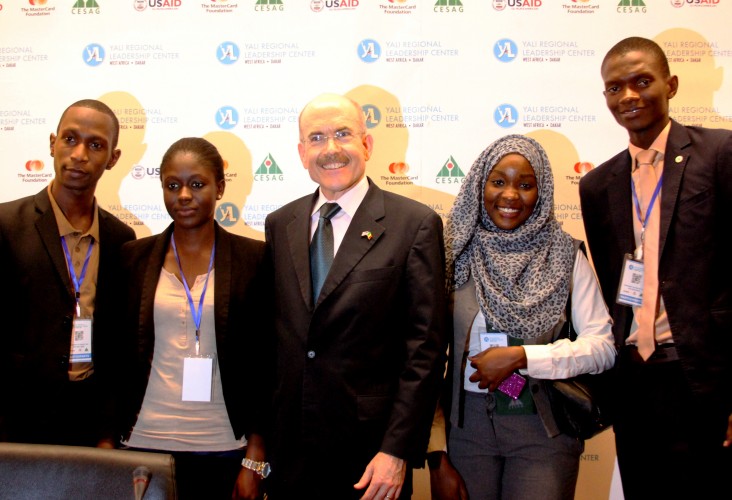
Facility will train up to 8,000 young leaders under YALI initiative
For Immediate Release
The U.S. government inaugurated a new Regional Leadership Center (RLC) that will train thousands of West African young people aged 18 to 35 in entrepreneurship, pubic management, and civic engagement over the next four years. The center is one of four on the continent developed as part of President Obama’s Young Africa Leaders Initiative (YALI).
At the inauguration, U.S. Ambassador to Senegal James P. Zumwalt, called on governments, civil society and the private sectors of 16 countries covered by the RLC to join the public-private partnership to help shape Africa’s future through support of the center’s work for the next generation of Africa’s leaders.
“This is an exciting time for all talented young Africans as they develop a vast network of leaders ready to build the nations they believe in,” Ambassador Zumwalt said at an inaugural ceremony today. “At this Center, thousands of young Africans will meet – some face-to-face, others virtually – to incubate new ideas.”
Joining Ambassador Zumwalt as co-chair of the inauguration was Senegal’s Minister of Youth, Employment and Citizen Construction, Mame Mbaye Niang, along with diplomatic representatives of the 15 other Francophone and Lusophone countries in the region.
Thanking the Government of Senegal for its engagement and support for the promotion of youth, the Ambassador lauded the commitment of the Minister, who he said has been a “strong ally involved in the promotion of leadership and youth empowerment” who “supports a laboratory of ideas on innovation.”
“For his part, the Minister of Youth Mr. Mame Mbaye Niang expressed the interest that his ministry gives to this center, a veritable incubator for the promotion of youth.
"This regional leadership center will serve as a powerful lever for young African leaders,” Niang said. “It will stimulate their understanding of important issues and strengthen democratic governance, peace and security across the African continent.”
The official inauguration was preceded by a two-day forum organized by the center’s implementing partner, the African Center for Higher Education and Management (CESAG) with 150 young leaders of the 16 countries on the three different axes of the YALI program, including entrepreneurship, civic engagement and public management. A youth representative presented the findings of the forum at the launch.
Like the other centers in Nairobi, Johannesburg and Accra, the Dakar facility administered by the U.S. Agency for International Development (USAID) will provide short-term leadership training for 8,000 young people in four years including 4,000 online in a network that spans across the African continent and around the world.
With the establishment of a the Dakar-based YALI center of West Africa, USAID seeks to build on existing initiatives that work with young leaders and to encourage new and innovative partnerships. The center will forge links and build on the successes achieved by the young fellows African leaders Mandela Washington Fellowship (MWF), and other programs for young leaders in Africa currently supported by the U.S. government, the private sector and other sources.
Over the next four years, the United States will contribute $11 million to leverage an additional $11 million for a total of $22 million in partnership with the private sector, universities and other organizations. Master Card is the principal private sector partner already contributing to the center, alongside other companies such as Citibank, Microsoft, Cisco, Tigo, and Sonatel.
During his last African tour in July 2015, President Obama announced the upcoming opening of the Dakar RLC, which also covers Benin, Burkina Faso, Cameroon, Cape Verde, Chad, Cote d’Ivoire, Equatorial Guinea, Gabon, Guinea, Guinea Bissau, Mali, Mauritania, Niger, Sao Tome and Principe, and Togo.







Comment
Make a general inquiry or suggest an improvement.